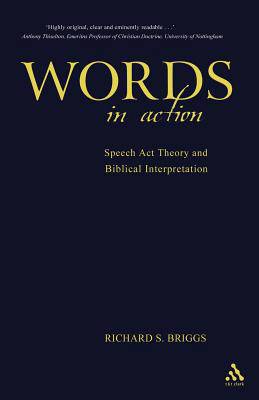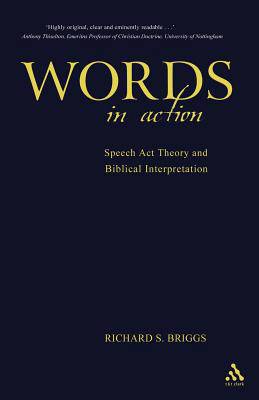
- Retrait gratuit dans votre magasin Club
- 7.000.000 titres dans notre catalogue
- Payer en toute sécurité
- Toujours un magasin près de chez vous
- Retrait gratuit dans votre magasin Club
- 7.000.0000 titres dans notre catalogue
- Payer en toute sécurité
- Toujours un magasin près de chez vous
115,45 €
+ 230 points
Description
How is the biblical text understood and how does it function in the life of the reader today?
Richard Briggs first provides an illuminating introduction to the nature and claims of speech art theory. This seeks to extend our understanding of both spoken and written means of communication by seeing them not as merely representational or 'reality-depicting', but as acting or causing acts to be performed through the words themselves.
Briggs goes on to discuss to what extent the application of speech act theory might be helpful in the interpretation of biblical texts. In one of the first book-length explorations of this topic, he examines in detail several biblical speech acts of particular theological significance, including the confession of sin, forgiveness and teaching.
Through exploring the specific ways in which the reader is drawn into the performative action of the biblical text, and how speech act theory forces the reader to look beyond language into the world which gives the language its ability to function, speech act theory is shown to offer valuable insights within today's complex hermeneutical debate.
'A very significant volume . . . '
Alan Torrance, Professor of Divinity, University of Andrews
'An excellent piece of work . . . which is thoroughly acquainted with speech act theory and takes the debate forward in a variety of creative, exegetical and theological ways.'
Dr Craig Bartholomew, University of Gloucestershire
Richard Briggs first provides an illuminating introduction to the nature and claims of speech art theory. This seeks to extend our understanding of both spoken and written means of communication by seeing them not as merely representational or 'reality-depicting', but as acting or causing acts to be performed through the words themselves.
Briggs goes on to discuss to what extent the application of speech act theory might be helpful in the interpretation of biblical texts. In one of the first book-length explorations of this topic, he examines in detail several biblical speech acts of particular theological significance, including the confession of sin, forgiveness and teaching.
Through exploring the specific ways in which the reader is drawn into the performative action of the biblical text, and how speech act theory forces the reader to look beyond language into the world which gives the language its ability to function, speech act theory is shown to offer valuable insights within today's complex hermeneutical debate.
'A very significant volume . . . '
Alan Torrance, Professor of Divinity, University of Andrews
'An excellent piece of work . . . which is thoroughly acquainted with speech act theory and takes the debate forward in a variety of creative, exegetical and theological ways.'
Dr Craig Bartholomew, University of Gloucestershire
Spécifications
Parties prenantes
- Auteur(s) :
- Editeur:
Contenu
- Nombre de pages :
- 368
- Langue:
- Anglais
Caractéristiques
- EAN:
- 9780567083456
- Date de parution :
- 01-07-04
- Format:
- Livre broché
- Format numérique:
- Trade paperback (VS)
- Dimensions :
- 140 mm x 216 mm
- Poids :
- 426 g

Les avis
Nous publions uniquement les avis qui respectent les conditions requises. Consultez nos conditions pour les avis.






